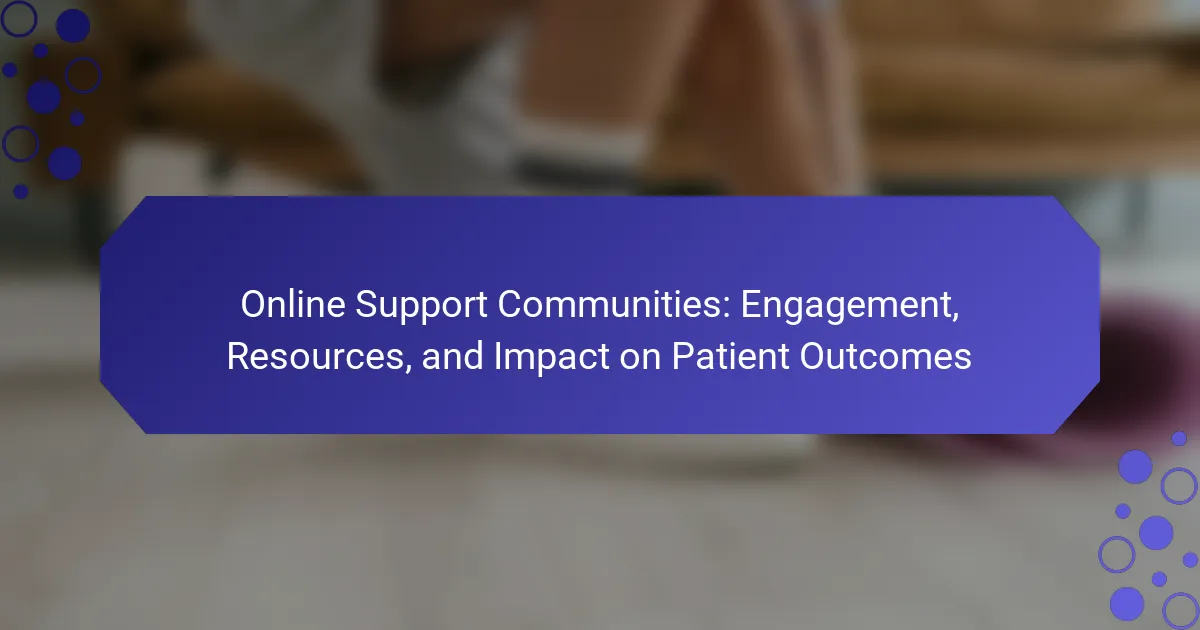Online support communities play a crucial role in enhancing patient engagement and improving health outcomes. They provide emotional support, facilitate information sharing, and offer valuable resources for managing health challenges. Despite facing challenges like maintaining engagement and ensuring accurate information, successful communities foster strong connections and promote proactive health management. This article explores the benefits, resources, and impact of these platforms on patient experiences.
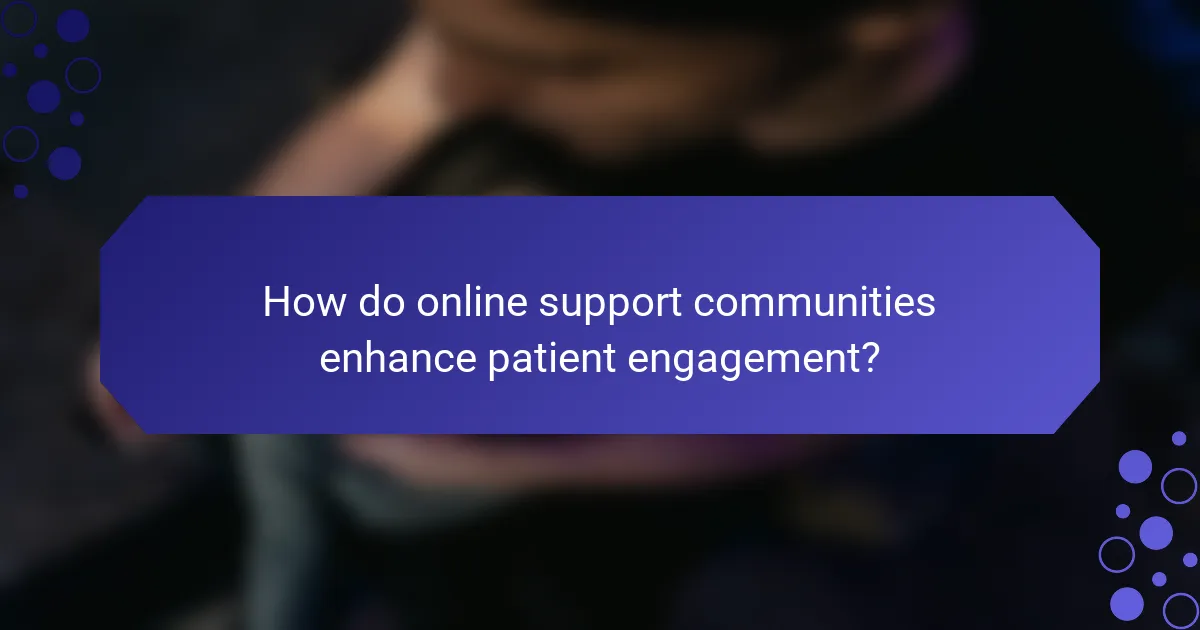
How do online support communities enhance patient engagement?
Online support communities significantly enhance patient engagement by fostering connection, sharing experiences, and providing access to resources. These platforms empower patients to participate actively in their healthcare journey. They offer emotional support, facilitate knowledge exchange, and improve adherence to treatment plans. As a result, patients often report higher satisfaction and better health outcomes. Engaging with peers can also reduce feelings of isolation, promoting a sense of belonging and community.
What are the primary motivations for patients to join these communities?
Patients join online support communities primarily for emotional support, information sharing, and a sense of belonging. These motivations help individuals cope with their health challenges. Emotional support fosters resilience, while shared experiences provide valuable insights. Access to resources enhances knowledge about conditions and treatments. Additionally, connections with others facing similar issues create a supportive environment that can improve overall well-being.
How do different demographics interact within online support platforms?
Different demographics engage with online support platforms in varied ways based on age, gender, and cultural background. Younger users often prefer visual content and real-time interactions, while older users may value detailed written resources. Gender differences can influence communication styles, with women typically seeking emotional support and men focusing on problem-solving. Cultural backgrounds shape the perception of mental health, affecting the willingness to participate. Understanding these dynamics enhances platform effectiveness and improves patient outcomes.
What role does anonymity play in fostering engagement?
Anonymity significantly enhances engagement in online support communities. It allows users to share experiences without fear of judgment, fostering open communication. This environment encourages participation, leading to increased sharing of resources and emotional support. As a result, patients experience improved outcomes and a sense of belonging.
Which features drive higher participation rates among users?
Higher participation rates among users in online support communities are driven by several key features. Engaging content, user-friendly interfaces, and active moderation significantly enhance user interaction.
Additionally, personalized support and the ability to share experiences foster a sense of belonging. Access to valuable resources, such as expert advice and educational materials, further encourages participation.
Finally, regular community events and feedback mechanisms help maintain user interest and involvement. These features collectively contribute to a vibrant and supportive online environment.
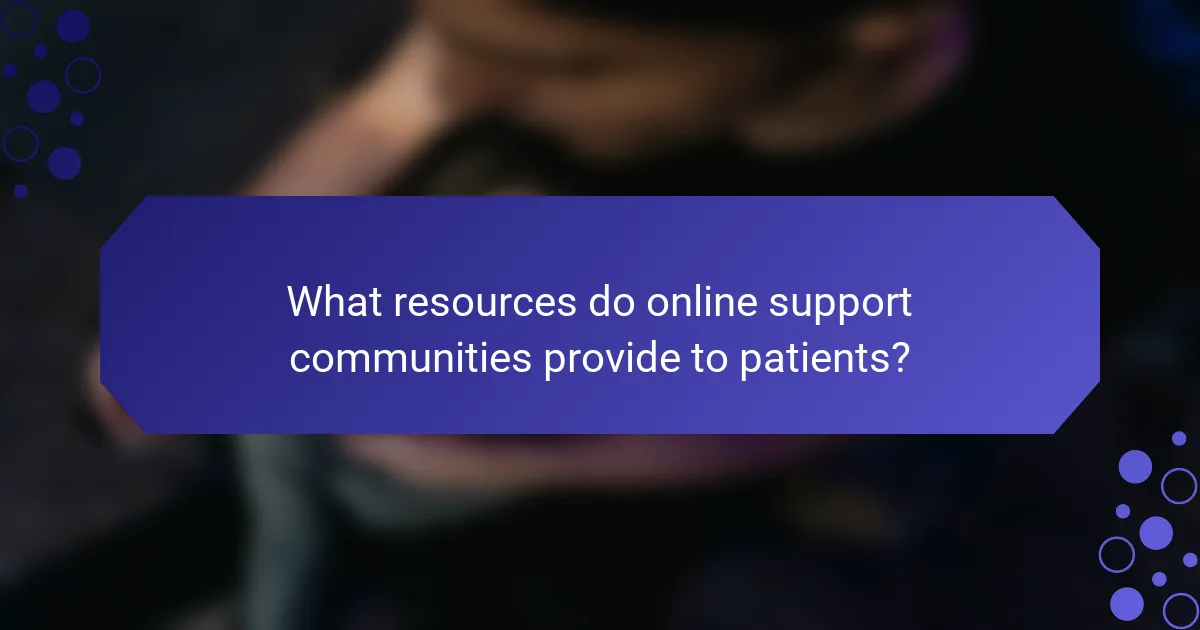
What resources do online support communities provide to patients?
Online support communities provide patients with emotional support, information sharing, and resources for coping with health challenges. These platforms foster connections among individuals facing similar conditions, enhancing patient engagement and empowerment. Members can access educational materials, share personal experiences, and receive guidance from peers, improving their overall well-being. Additionally, many communities offer expert insights and links to professional resources, reinforcing their role in patient care.
How do peer-led discussions contribute to knowledge sharing?
Peer-led discussions significantly enhance knowledge sharing by fostering trust and relatability among participants. These interactions allow individuals to share personal experiences, which can lead to deeper understanding and insights. Additionally, peer-led formats encourage active participation, making it easier for members to ask questions and clarify doubts. This collaborative environment not only facilitates the exchange of information but also promotes emotional support, enhancing overall engagement within online support communities. As a result, participants often feel more empowered to apply shared knowledge, positively impacting patient outcomes.
What types of professional resources are commonly available?
Online support communities typically offer forums, chat groups, resource libraries, and expert-led webinars. These resources enhance patient engagement and provide valuable information. They foster connections among patients, caregivers, and healthcare professionals, ultimately improving health outcomes.
How can patients access mental health support through these platforms?
Patients can access mental health support through online support communities by joining platforms that facilitate peer interaction and resource sharing. These platforms offer various engagement methods, including forums, live chats, and virtual support groups. Users can find valuable resources such as educational materials, coping strategies, and access to mental health professionals. Many communities prioritise anonymity and inclusivity, making it easier for individuals to seek help. As a result, participation can lead to improved patient outcomes, such as reduced feelings of isolation and enhanced emotional well-being.
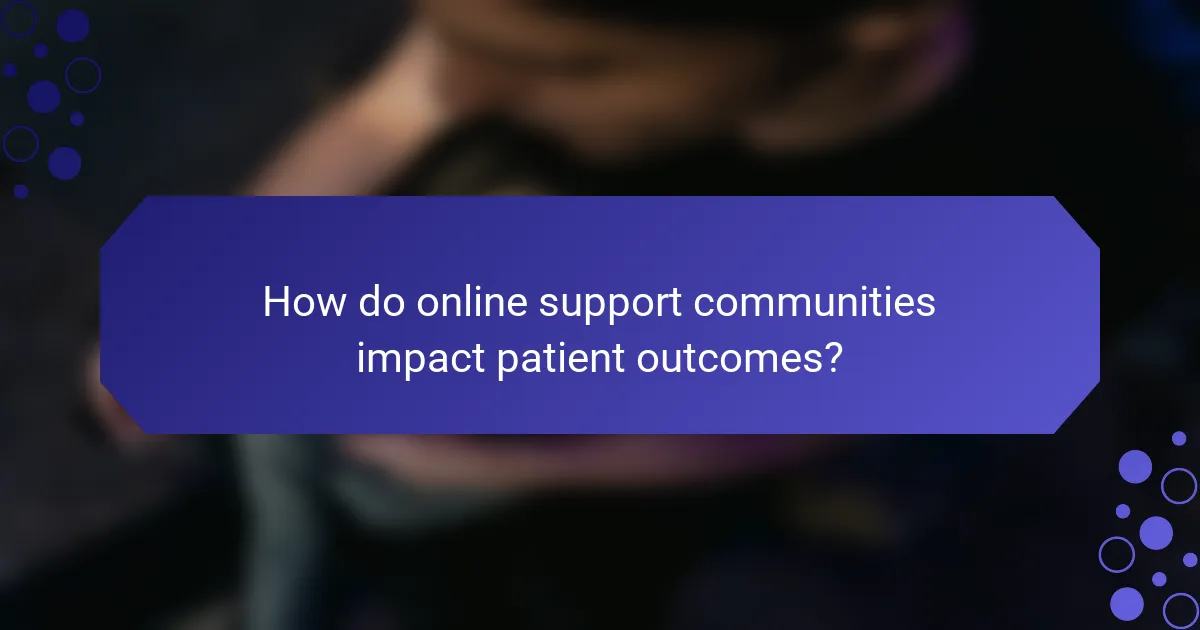
How do online support communities impact patient outcomes?
Online support communities significantly enhance patient outcomes by fostering engagement and providing valuable resources. These platforms facilitate emotional support, information sharing, and practical advice, leading to improved mental well-being and adherence to treatment plans. Studies show that patients involved in online communities report higher satisfaction and lower anxiety levels, which can positively impact recovery rates. Additionally, the sense of belonging and shared experiences within these communities can motivate individuals to take proactive steps in managing their health.
What evidence supports the effectiveness of these communities on health management?
Online support communities significantly improve health management through enhanced patient engagement and resource sharing. Research indicates that participants report better health outcomes and increased adherence to treatment plans. A study found that 70% of users felt more empowered in managing their conditions after joining these communities. Additionally, communities provide access to diverse resources, including expert advice and shared experiences, which facilitate informed decision-making. These factors collectively contribute to improved patient satisfaction and overall health management effectiveness.
Which patient populations benefit the most from online support?
Patients with chronic illnesses, mental health conditions, and those in remote areas benefit the most from online support. These populations find community, resources, and emotional support through digital platforms. Chronic illness patients often engage with others facing similar challenges, fostering a sense of belonging. Mental health patients can access immediate support, reducing feelings of isolation. Individuals in remote areas gain access to resources otherwise unavailable, enhancing their healthcare experience. Online support communities significantly improve patient outcomes by providing tailored advice and shared experiences.
How do these communities influence treatment adherence and self-management?
Online support communities significantly enhance treatment adherence and self-management through shared experiences and resources. They provide emotional support and practical advice, fostering a sense of belonging. Members often exchange strategies that improve self-care routines, leading to better health outcomes. Research indicates that engagement in these communities correlates with increased adherence to treatment plans, as individuals feel motivated by peer encouragement.
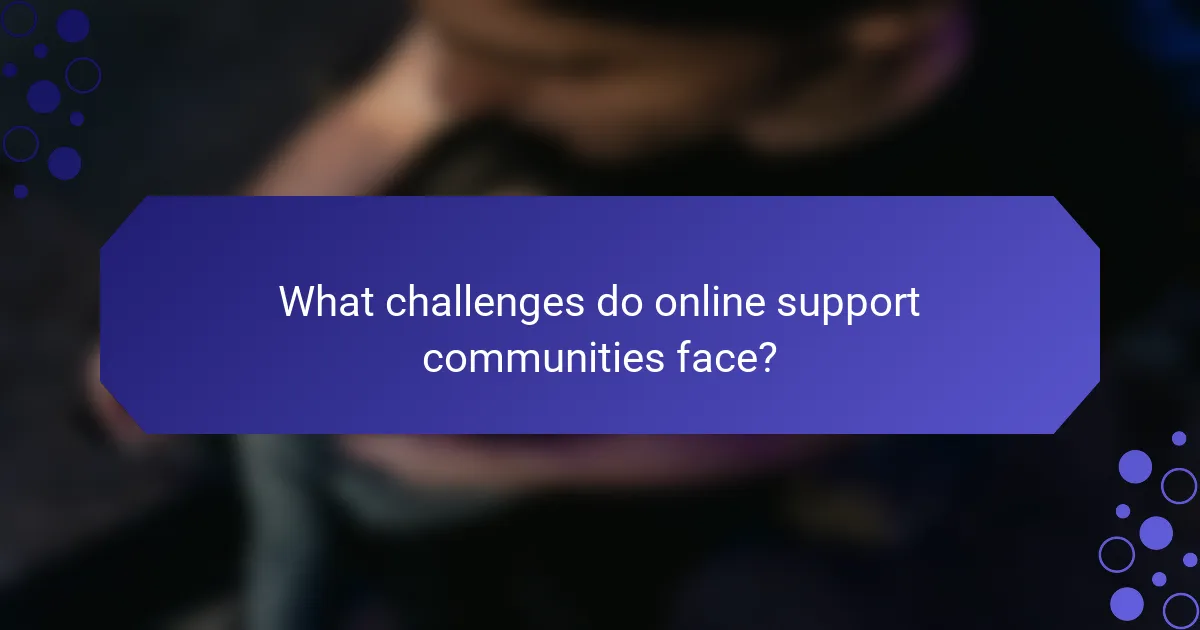
What challenges do online support communities face?
Online support communities face challenges such as maintaining engagement, ensuring accurate information, and managing diverse member needs. These obstacles can hinder their effectiveness and impact on patient outcomes. Engagement often fluctuates due to varying levels of member commitment. Additionally, misinformation can spread easily, leading to confusion and potential harm. Lastly, the diversity of experiences and expectations among members can complicate the creation of a supportive environment. Addressing these challenges is crucial for enhancing the overall effectiveness of online support communities.
How do misinformation and disinformation affect community dynamics?
Misinformation and disinformation can significantly disrupt community dynamics by eroding trust and spreading confusion. Online support communities rely on accurate information for effective engagement and resource sharing. When false information circulates, patient outcomes may suffer due to misguided decisions based on unreliable data. As a result, community cohesion weakens, leading to decreased participation and support among members.
What are the privacy concerns associated with online support groups?
Online support groups can pose significant privacy concerns. Participants may inadvertently share personal information, risking exposure of sensitive data. Additionally, platforms may lack robust security measures, making user data vulnerable to breaches. Anonymity can be compromised if members disclose identifiable details or if the platform tracks user activity. Users should be cautious and understand the privacy policies of these communities before engaging.
How do moderators and community guidelines influence user experience?
Moderators and community guidelines significantly enhance user experience in online support communities by ensuring a safe, respectful, and constructive environment. Effective moderation fosters engagement by addressing conflicts and maintaining focus on supportive interactions. Clear guidelines set expectations for behaviour, which helps users feel secure in sharing personal experiences. Research indicates that well-structured communities lead to better patient outcomes by promoting open communication and resource sharing. Ultimately, the presence of moderators and clear guidelines cultivates a positive atmosphere that encourages participation and support among members.
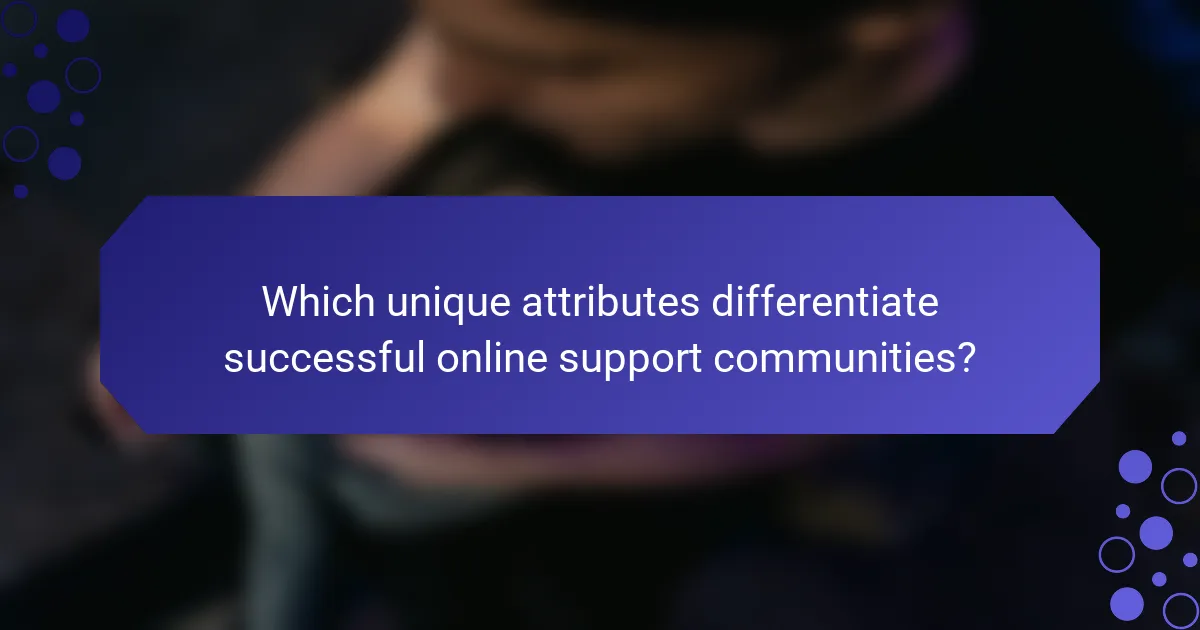
Which unique attributes differentiate successful online support communities?
Successful online support communities are differentiated by their unique attributes such as strong member engagement, diverse resource availability, and a focus on improving patient outcomes. These communities foster connection through active participation and shared experiences. They provide valuable resources, including expert insights and emotional support, enhancing the overall experience. Additionally, their impact on patient outcomes is significant, often leading to improved health management and emotional well-being.
What innovative technologies are being utilized to enhance user experience?
Innovative technologies enhancing user experience in online support communities include AI-driven chatbots, telehealth platforms, and data analytics tools. These technologies improve engagement by providing real-time support, personalized resources, and insights into patient needs. AI chatbots can respond to inquiries instantly, while telehealth platforms facilitate remote consultations. Data analytics tools help track user interactions, allowing for tailored content delivery. Together, these advancements positively impact patient outcomes by fostering a supportive and responsive online environment.
How do cultural differences shape community interactions and support?
Cultural differences significantly influence community interactions and support in online environments. These variations shape communication styles, support expectations, and the types of resources shared among community members.
For instance, collectivist cultures may prioritise group harmony and shared experiences, fostering a supportive atmosphere. In contrast, individualistic cultures might emphasise personal achievements and self-reliance, affecting how members engage with resources.
Additionally, language barriers can impact the effectiveness of support. Communities that accommodate diverse languages often see higher engagement levels. Cultural norms also dictate how emotional expressions are perceived, influencing the overall support dynamics.
Ultimately, understanding these cultural nuances enhances the effectiveness of online support communities, leading to improved patient outcomes through tailored engagement strategies.
What specific success stories highlight the impact of these communities?
Online support communities have significantly improved patient outcomes through shared experiences and resources. One notable success story is the impact of cancer support forums, where members report increased emotional resilience and reduced feelings of isolation. Another example is diabetes management groups, which have led to better adherence to treatment plans and improved blood sugar control among participants. Additionally, mental health communities have shown a marked decrease in symptoms for many users, highlighting the power of peer support. These stories underscore the effectiveness of engagement and resource sharing in enhancing health outcomes.
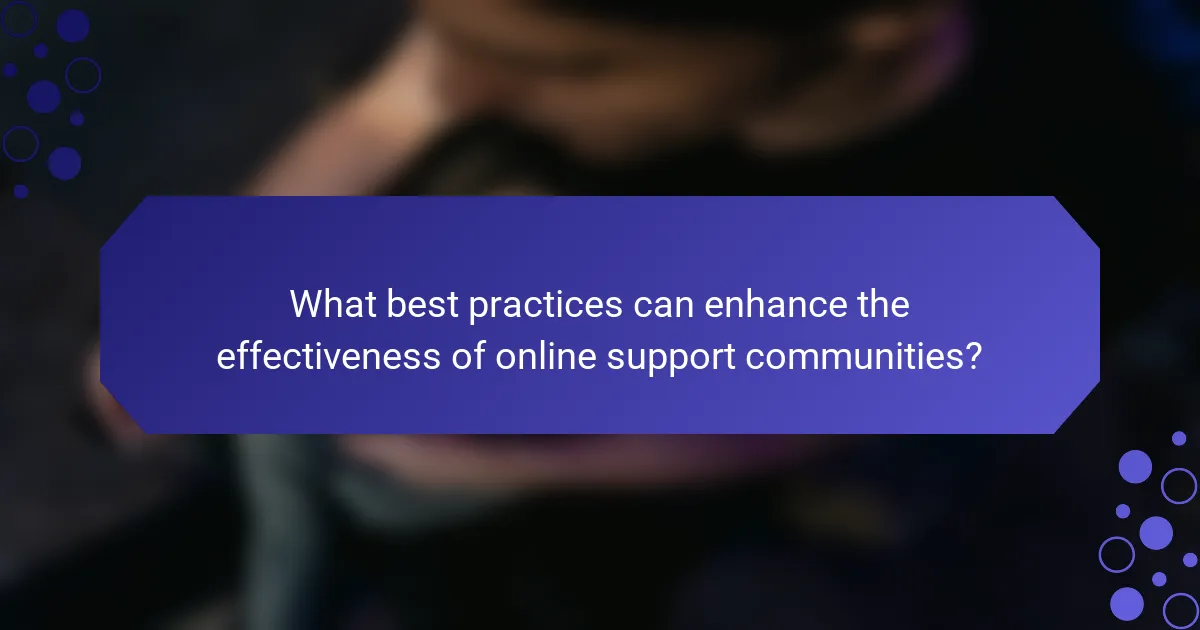
What best practices can enhance the effectiveness of online support communities?
To enhance the effectiveness of online support communities, focus on fostering engagement, providing valuable resources, and measuring impact on patient outcomes. Encourage active participation through regular interaction and feedback mechanisms. Utilise diverse resources such as expert-led webinars and informational articles to support members. Implement metrics to assess community effectiveness, ensuring continuous improvement and alignment with patient needs.
How can community leaders foster a supportive environment?
Community leaders can foster a supportive environment by encouraging open communication and collaboration among members. They should provide resources such as educational materials and access to expert guidance. Regular engagement through events and discussions strengthens relationships and builds trust. Recognising individual contributions enhances a sense of belonging, which positively impacts patient outcomes.
What strategies can patients use to maximize their benefits from these platforms?
Patients can maximize benefits from online support communities by actively engaging, sharing experiences, and utilising available resources. Participation fosters connection, enhances emotional support, and provides diverse perspectives. Regularly accessing educational materials and expert advice available on these platforms can improve health literacy and coping strategies. Establishing a routine for interaction can lead to sustained support and accountability among peers.
What common mistakes should users avoid when participating in online support communities?
Users should avoid sharing personal information, engaging in negativity, and neglecting community guidelines when participating in online support communities. These mistakes can hinder productive interactions and compromise user safety.
Neglecting to read community rules can lead to misunderstandings and conflicts. Failing to respect diverse perspectives may alienate members and reduce support effectiveness. Additionally, not seeking professional advice when necessary can lead to misinformation and inadequate support.
